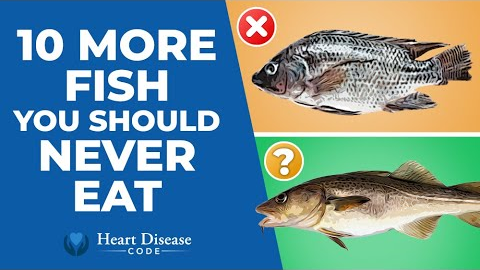10 More Fish You Should NEVER Eat
414,231 View
Share this Video
- Publish Date:
- July 24, 2023
- Category:
- Food
- Video License
- Standard License
- Imported From:
- Youtube
Tags

► ► FREE BOOK + DOCUMENTARY: https://heartdiseasecode.com/health/
► ► JOIN HEART DISEASE CODE: https://heartdiseasecode.com
----------------------------------------------------------------------------------------------------
👍 We want to keep making informative research-based videos for you. So if you got value from this video and would like more of it, you can send us a 'Super Thanks' by clicking the Thanks button at the bottom of the video. We would greatly appreciate it. Thank you! :)
----------------------------------------------------------------------------------------------------
🔎 In this video, we present an expanded list of 10 fish you should never eat, in addition to the original 7 from our previous video, due to high levels of toxins like mercury and PCBs. We also discuss fish with questionable farming practices, and mislabeling, and provide a list of healthier fish options with lower contamination risks.
10. Marlin fish should be avoided due to high levels of mercury, a toxic heavy metal that can have detrimental effects on human health, particularly on the nervous system.
9. Tropical reef and warm-water fish should be approached with caution as they may be more prone to containing toxins, such as ciguatoxins and heavy metals, due to their position in the food chain and potential exposure to pollution.
8. Farmed shrimp may not be the healthiest choice due to concerns over the farming practices, use of antibiotics, potential pollution, and the presence of contaminants such as antibiotics, pesticides, and heavy metals in the shrimp.
7. Spanish mackerel should be consumed with caution due to its potential high levels of mercury, which can pose health risks, especially for pregnant women and young children.
6. Basa, a type of freshwater fish often marketed as "Asian catfish," should be approached with caution due to concerns about its farming practices, potential contaminants, and mislabeling issues, which can make it challenging to determine its true origin and quality.
5. Fish oils, while widely promoted for their omega-3 fatty acid content and potential health benefits, can be problematic due to the risk of contamination with environmental pollutants like mercury and PCBs, as well as issues of sustainability and overfishing.
4. Deep-fried battered fish, while popular and tasty, can pose health risks due to the high levels of unhealthy fats and calories, as well as the formation of harmful compounds like Advanced Glycation End Products (AGEs) during the frying process.
3. Moray eel, although a delicacy in some cultures, should be approached with caution due to its potential to contain high levels of mercury and other contaminants, which can be harmful to human health when consumed regularly.
2. Barracuda should be avoided due to its high levels of mercury and potential for ciguatera poisoning, a foodborne illness caused by consuming fish that have accumulated toxins produced by certain microorganisms in tropical reef ecosystems.
1. Puffer fish contain a deadly toxin called tetrodotoxin, which can paralyze muscles and lead to respiratory failure, causing death. Mishandling or improper preparation of puffer fish can result in severe poisoning and even fatality.
----------------------------------------------------------------------------------------------------
▶️ More Videos You Might Like:
7 Kinds of Fish You Should Never Eat ► https://youtu.be/spNe4oxrNGo
Top 7 Foods To Clean Arteries And Prevent Heart Attacks ► https://youtu.be/Vv9TvAYyqkg
5 Worst Fruits For High Blood Pressure ► https://youtu.be/haTdWct3GKs
Top 8 Worst Foods for High Blood Pressure ► https://youtu.be/SmHhci9cNmg
----------------------------------------------------------------------------------------------------
Disclaimer: All material in this publication is provided for information only and may not be construed as medical advice or instruction. No action should be taken based solely on the contents of this publication; instead, viewers should consult appropriate health professionals on any matter relating to their health and well-being. The information and opinions provided in this publication are believed to be accurate and sound, based on the best judgment available to the producers, but viewers who fail to consult with appropriate health authorities assume the risk of any injuries. The publisher is not responsible for errors or omissions. The material in this report has not been approved by the Food and Drug Administration. The products discussed are not intended to diagnose, treat, cure, or prevent any disease.














